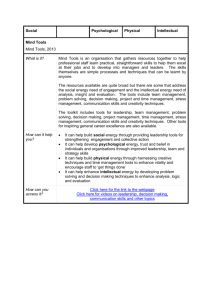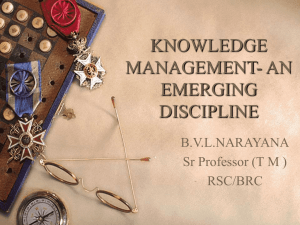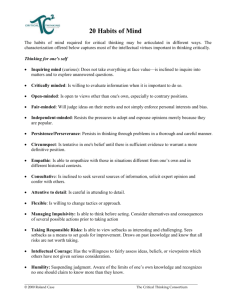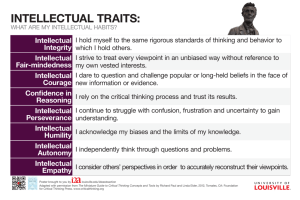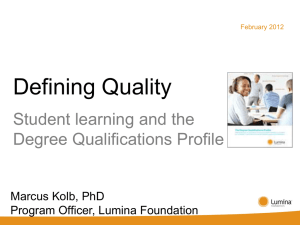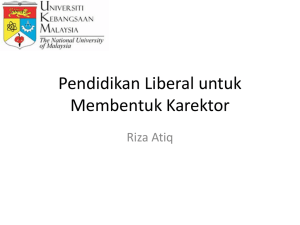Academic Freedom and Educational Responsibility
advertisement
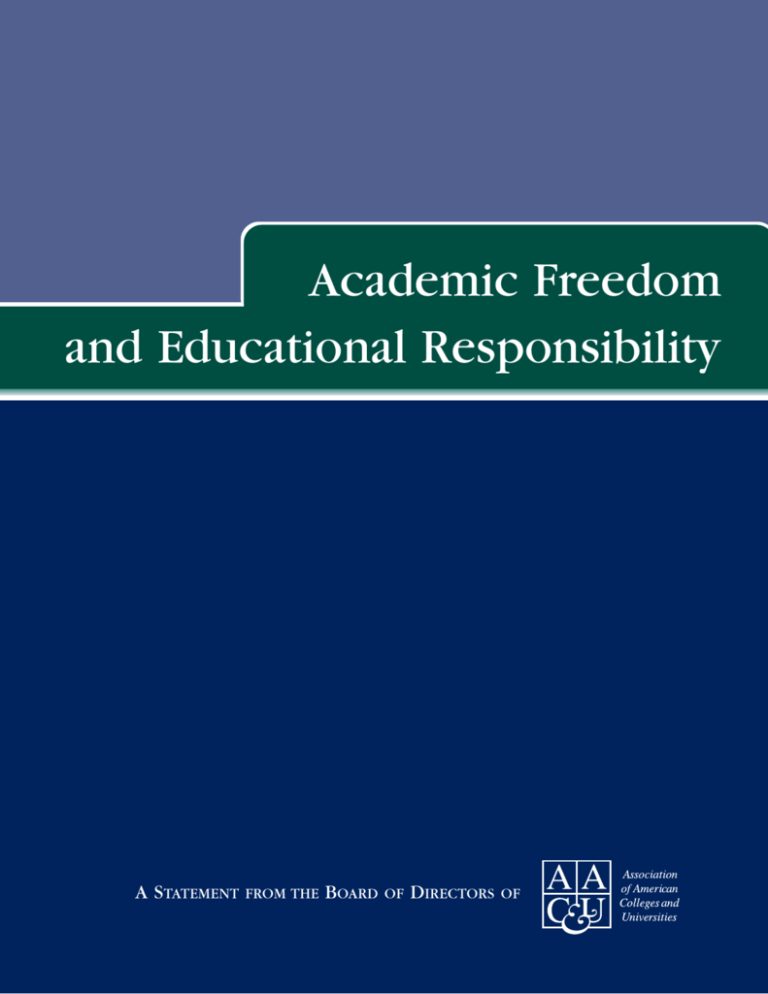
Academic Freedom and Educational Responsibility A STATEMENT FROM THE BOARD OF DIRECTORS OF Association of American Colleges and Universities 1818 R Street, NW, Washington, DC 20009 www.aacu.org Copyright © 2006 by the Association of American Colleges and Universities. Permission to photocopy is granted for non-commercial use. The following credit line must appear on the first page of every copy: “Reprinted with permission. Copyright 2006 by the Association of American Colleges and Universities.” For excerpts, the following credit line must be used: “Excerpted with permission from Academic Freedom and Educational Responsibility. Copyright 2006 by the Association of American Colleges and Universities.” ISBN 0-9763576-9-0 Academic Freedom and Educational Responsibility is available for download (in PDF format) from www.aacu.org. Printed copies are available for purchase from AAC&U; discounted rates are available for bulk orders of ten copies or more. For additional information or to place an order, visit www.aacu.org, e-mail pub_desk@aacu.org, or call 202.387.3760. Contents Preface. . . . . . . . . . . . . . . . . . . . . . . . . . . . . . . . . . . . . . . . . . . . . . . . . . . . . . . . . . iii Acknowledgments . . . . . . . . . . . . . . . . . . . . . . . . . . . . . . . . . . . . . . . . . . . . . . . . . v Academic Freedom and Educational Responsibility . . . . . . . . . . . . . . . . . . . . . . 1 Intellectual Diversity and the Indispensable Role of Liberal Education . What Is Not Required in the Name of Intellectual Diversity . . . . . . . . Academic Freedom and Scholarly Community . . . . . . . . . . . . . . . . . . . . Intellectual Diversity and the Development of Judgment . . . . . . . . . . . . Teaching Students to Form Their Own Judgments . . . . . . . . . . . . . . . . The Ideal Versus the Real . . . . . . . . . . . . . . . . . . . . . . . . . . . . . . . . . . . . . . . . . . . . . . . . . . . . . . . . . . . . . . . . . . . . . . . . . . . . . . . . . . . . 2 3 4 4 5 7 Academic Freedom and Educational Responsibility was approved by the 2005 Board of Directors of the Association of American Colleges and Universities: Chair Ronald A. Crutcher President, Wheaton College Past Chair Elisabeth A. Zinser President, Southern Oregon University Vice Chair Robert A. Corrigan President, San Francisco State University Treasurer R. Stanton Hales President, The College of Wooster President of AAC&U Carol Geary Schneider Bobby Fong President, Butler University Kati Haycock Director, The Education Trust Richard H. Hersh Senior Fellow, Council for Aid to Education Shirley S. Kenny President, State University of New York at Stony Brook Elaine P. Maimon Chancellor, University of Alaska Anchorage Gary Orfield Professor of Education and Social Policy, Harvard University Ex Officio/Chair, ACAD Virginia M. Coombs Provost and Vice Chancellor for Academic Affairs University of Wisconsin – River Falls Eduardo J. Padron District President, Miami Dade College Sharon Stephens Brehm Senior Advisor to the President, Indiana University Arnold Rampersad Senior Associate Dean for the Humanities, Stanford University Anthony Carnevale Senior Fellow, National Center on Education and the Economy Christopher C. Dahl President, State University of New York College at Geneseo John J. DeGioia President, Georgetown University Rosemary DePaolo Chancellor, University of North Carolina at Wilmington Thomas L. “Les” Purce President, The Evergreen State College Jamienne S. Studley President, Public Advocates, Inc. Daniel F. Sullivan President, St. Lawrence University Beverly Daniel Tatum President, Spelman College Carolyn G. Williams President, City University of New York Bronx Community College Preface On behalf of the Association of American Colleges and Universities (AAC&U), we are pleased to present Academic Freedom and Educational Responsibility. This statement, framed and approved by AAC&U’s board of directors, is designed to provide the larger context missing from current public debates about intellectual diversity in undergraduate education. It addresses many of the myths and misrepresentations that have been perpetuated through the insistent external campaign to encourage political oversight of teaching and learning practices on college and university campuses. In particular, the statement clarifies the vital role of diverse perspectives in helping students develop their own knowledge and intellectual capacities. Self-appointed political critics of the academy have presented equal representation for conservative and progressive points of views as the key to quality. But the college classroom is not a talk show. Rather, it is a dedicated context in which students and teachers seriously engage difficult and contested questions with the goal of reaching beyond differing viewpoints to a critical evaluation of the relative claims of different positions. Central to the educational aims and spirit of academic freedom, diversity of perspectives is a means to an end in higher education, not an end in itself. Including diversity is a step in the larger quest for new understanding and insight. But an overemphasis on diversity of perspectives as an end in itself threatens to distort the larger responsibilities of intellectual work in the academy. In publishing Academic Freedom and Educational Responsibility, we invite college and university leaders to use it actively to inform public and campus discussions about the academy’s role in both exploring the contentious issues of our time and providing contexts for civil dialogue and constructive inquiry. This statement can be used to good effect in any number of contexts, including discussions— with trustees and regents, with faculty and departments, with administrators and staff, and especially with students—about the educational principles at stake in the academic freedom debate. Robert A. Corrigan Chair of the Board of Directors Carol Geary Schneider President iii Acknowledgments The Board of Directors of the Association of American Colleges and Universities extends its warm thanks to Dr. Jerry Gaff, senior scholar at AAC&U, for his work in bringing this statement from concept to completion. The board further thanks the many colleagues from member colleges and universities and from sister organizations who responded to earlier drafts. In framing this statement, the board has drawn on concepts that were first articulated in the 1991 publication The Challenge of Connecting Learning, which was crafted by members of the national advisory committee for an Association of American Colleges (now AAC&U) initiative on liberal learning and “study-in-depth.” Challenge was written by Jonathan Z. Smith, the Robert O. Anderson Distinguished Professor of the Humanities at the University of Chicago. The board thanks Professor Smith and the other members of the national advisory committee for their leadership and vision. AAC&U’s work on study-indepth was supported by generous grants from the Ford Foundation and the U. S. Fund for the Improvement of Postsecondary Education. The board also acknowledges AAC&U’s signal debt to William S. Perry Jr. of Harvard University, whose landmark work on the study of students’ intellectual and ethical development in the college years helped illuminate the importance of these issues for a generation of faculty members, student affairs leaders, and researchers on student learning. The board thanks Dr. Lee Knefelkamp, professor of psychology and education at Teachers College, Columbia University, and senior scholar at AAC&U, for her assistance in shaping this statement and for her leadership in making students’ intellectual and ethical development a core theme in AAC&U’s work on the aims and outcomes of student learning in college. Finally, the board thanks David Tritelli, AAC&U’s senior academic editor, and Darbi Bossman, AAC&U’s print production manager and graphic designer, for their expert assistance in bringing the statement to publication. v Association of American Colleges and Universities Academic Freedom and Educational Responsibility Academic freedom and responsibility have long been topics for public concern and debate. Academic freedom to explore significant and controversial questions is an essential precondition to fulfill the academy’s mission of educating students and advancing knowledge. Academic responsibility requires professors to submit their knowledge and claims to rigorous and public review by peers who are experts in the subject matter under consideration; to ground their arguments in the best available evidence; and to work together to foster the education of students. The Association of American Colleges and Universities (AAC&U), in concert with the American Association of University Professors, helped establish the principles of academic freedom early in the twentieth century, and recently AAC&U joined with other associations to reaffirm them.* Today, new challenges to academic freedom have arisen from both the right and the left. On the right, conservative activist David Horowitz, founder of Students for Academic Freedom, has fashioned an “academic bill of rights” that is being considered in several states ostensibly as a means of protecting “conservative” students from alleged indoctrination by the purportedly “liberal” views of faculty. This bill inappropriately invites political oversight of scholarly and educational work. On the left, anti-war protests by students have interrupted speeches by proponents of current national policies. Some protestors have sought to silence—rather than debate—positions with which they do not agree. These challenges prompt AAC&U to revisit the basic principles involved and to discuss the role of academic freedom. There is, however, an additional dimension of academic freedom that was not well developed in the original principles, and that has to do with the responsibilities of faculty members for educational programs. Faculty are responsible for establishing goals for student learning, for designing and implementing programs of general education and specialized study that intentionally cultivate the intended learning, and for assessing students’ achievement. In these matters, faculty must work collaboratively with their colleagues in their departments, schools, and institutions as well as with relevant administrators. Academic freedom is necessary not just so faculty members can conduct their individual research and teach their own courses, but so they can enable students—through whole college programs of study—to acquire the learning they need to contribute to society. As faculty carry out this mission, it is inevitable that students will encounter ideas, books, and people that challenge their preconceived ideas and beliefs. The resulting tension between * The Association of American Colleges (now the Association of American Colleges and Universities) began work on this issue in the early 1920s. Then, through a series of joint conferences begun in 1934, representatives of the American Association of University Professors and of the Association of American Colleges established the principles set forth in the 1940 Statement of Principles on Academic Freedom and Tenure. In 2005, the Association of American Colleges and Universities, along with twenty-eight other higher education organizations, endorsed Academic Rights and Responsibilities, the American Council on Education’s statement on intellectual diversity on college and university campuses. 1 Academic Freedom and Educational Responsibility the faculty’s freedom to teach—individually and collectively—and the students’ freedom to form independent judgments opens an additional dimension of academic freedom and educational responsibility that deserves further discussion, both with the public and with students themselves. The clash of competing ideas is an important catalyst, not only for the expansion of knowledge but also in students’ development of independent critical judgment. Recognizing this dynamic, many wellintentioned observers underline the importance of “teaching all sides of the debate” in college classrooms. Teaching the debates is important but by no means sufficient. It is also essential that faculty help students learn—through their college studies—to engage differences of opinion, evaluate evidence, and form their own grounded judgments about the relative value of competing perspectives. This too is an essential part of higher education’s role both in advancing knowledge and in sustaining a society that is free, diverse, and democratic. Intellectual Diversity and the Indispensable Role of Liberal Education In any education of quality, students encounter an abundance of intellectual diversity—new knowledge, different perspectives, competing ideas, and alternative claims of truth. This intellectual diversity is experienced by some students as exciting and challenging, while others are confused and overwhelmed by the complexity. Liberal education, the nation’s signature educational tradition, helps students develop the skills of analysis and critical inquiry with particular All competing ideas on a subject do not emphasis on exploring and evaluating competing claims and different deserve to be included in a course or perspectives. With its emphasis on program, or to be regarded as equally breadth of knowledge and sophisticated habits of mind, liberal educavalid just because they have been asserted. tion is the best and most powerful way to build students’ capacities to form their own judgments about complex or controversial questions. AAC&U believes that all students need and deserve this kind of education, regardless of their academic major or intended career. Liberal education involves more than the mind. It also involves developing students’ personal qualities, including a strong sense of responsibility to self and others. Liberally educated students are curious about new intellectual questions, open to alternative ways of viewing a situation or problem, disciplined to follow intellectual methods to conclusions, capable of accepting criticism from others, tolerant of ambiguity, and respectful of others with different views. They understand and accept the imperative of academic honesty. Personal development is a very real part of intellectual development. Beyond fostering intellectual and personal development, a liberal education also enables students to develop meaning and commitments in their lives. In college they can explore different ways to relate to others, imagine alternative futures, decide on their intended careers, and consider their larger life’s work of contributing to the common good. Building such intellectual and personal capacities is the right way to warn students of the inappropriateness and dangers of indoctrination, help them see through the distortions of propaganda, 2 Association of American Colleges and Universities and enable them to assess judiciously the persuasiveness of powerful emotional appeals. Emphasizing the quality of analysis helps students see why unwelcome views need to be heard rather than silenced. By thoughtfully engaging diverse perspectives, liberal education leads to greater personal freedom through greater competence. Ensuring that college students are liberally educated is essential both to a deliberative democracy and to an economy dependent on innovation. What Is Not Required in the Name of Intellectual Diversity? There are several misconceptions about intellectual diversity and academic freedom, and we address some of them here. 1 In an educational community, freedom of speech, or the narrower concept of academic freedom, does not mean the freedom to say anything that one wants. For example, freedom of speech does not mean that one can say something that causes physical danger to others. In a learning context, one must both respect those who disagree with oneself and also maintain an atmosphere of civility. Anything less creates a hostile environment that limits intellectual diversity and, therefore, the quality of learning. 2 Students do not have a right to remain free from encountering unwelcome or “inconvenient questions,” in the words of Max Weber. Students who accept the literal truth of creation narratives do not have a right to avoid the study of the science of evolution in a biology course; anti-Semites do not have a right to a history course based on the premise that the Holocaust did not happen. Students protesting their institution’s sale of clothing made in sweatshops do not have a right to interrupt the education of others. Students do have a right to hear and examine diverse opinions, but within the frameworks that knowledgeable scholars—themselves subject to rigorous standards of peer review—have determined to be reliable and accurate. That is, in considering what range of views should be introduced and considered, the academy is guided by the best knowledge available in the community of scholars. 3 All competing ideas on a subject do not deserve to be included in a course or program, or to be regarded as equally valid just because they have been asserted. For example, creationism, even in its modern guise as “intelligent design,” has no standing among experts in the life sciences because its claims cannot be tested by scientific methods. However, creationism and intelligent design might well be studied in a wide range of other disciplinary contexts such as the history of ideas or the sociology of religion. 4 While the diversity of topics introduced in a particular area of study should illustrate the existence of debate, it is not realistic to expect that undergraduate students will have the opportunity to study every dispute relevant to a course or program. The professional judgment of teachers determines the content of courses. 3 Academic Freedom and Educational Responsibility Academic Freedom and Scholarly Community A college or university is a dedicated social place where a variety of competing claims to truth can be explored and tested, free from political interference. The persons who drive the production of knowledge and the process of education are highly trained professors, and they, through an elaborate process of review by professional peers, take responsibility as a community for the quality of their scholarship, teaching, and student learning. Trustees, administrators, policy makers, and other stakeholders also have important roles to play, but the faculty and their students stand at the center of the enterprise. The development of a body of knowledge involves scientists or other scholars in developing their best ideas and then subjecting them to empirical tests and/or searching scholarly criticism. Knowledge is not simply a matter of making an assertion but of developing the evidence for that assertion in terms that gain acceptance among those with the necessary training and expertise to evaluate the scholarly analysis. In order to contribute to knowledge, scholars require the freedom to pursue their ideas wherever they lead, unconstrained by political, religious, or other dictums. And scholars need the informed criticism of peers who represent a broad spectrum of insight and experience in order to build a body of knowledge. One of the great strengths of higher education in the United States is the integration of scholarly research and educational communities. Students benefit enormously when their learning is guided by thoughtful and knowledgeable scholars who come from diverse backgrounds and who are trained to high levels in a variety of disciplines. A discipline consists of a specialized community that, through intense collective effort, has formulated reliable methods for determining whether any particular claim meets accepted criteria for truth. But assertions from any single disciplinary community as to “what is the case” are themselves necessarily partial and bounded, because other disciplinary communities can and do provide different perspectives on the same topics. Economists, for example, see poverty through one set of lenses, while political scientists and historians contribute different, and sometimes directly competing, perspectives on the same issue. Any assertion from a particular individual or a specific intellectual community is necessarily simpler than the complexity it attempts to explain and describe. This is the central reason both scholars and students must work within a communal setting that involves multiple academic disciplines, and that fosters an ethos of communication, contestation, and civility. By creating such communities of inquiry, the academy ensures that no proposal stands without alternatives or arrogates to itself the claim of possessing the sole truth. The advancement of knowledge requires that intellectual differences be engaged and explored even as individuals with different points of view are also respected. Intellectual Diversity and the Development of Judgment Although one often hears that faculty “impart knowledge” to students, the reality is that, in a good liberal education, substantial time is devoted to teaching students how to acquire new knowledge for themselves and how to evaluate evidence within different areas of knowledge. To do this well, professors in the classroom also need academic freedom to explore their subjects—including contested questions and real-world implications—with their students. 4 Association of American Colleges and Universities To help students think critically about a subject or problem, faculty members need to take seriously what students already know or believe about that topic and engage that prior understanding so new learning modifies the old—complicating, correcting, and expanding it. This process of cultivating a liberal education is a journey that transforms the minds and hearts, and frequently the starting assumptions, of those involved—both teachers and students. Because knowledge is always expanding, the eventual destination is uncertain. To develop their own critical judgment, students also need the freedom to express their ideas publicly as well as repeated opportunities to explore a wide range of insights and perspectives. The diversity of the educational community is an important resource to this process; research shows that students are more likely to develop cognitive complexity when they frequently interact with people, views, and experiences that are different from their own. Expressing one’s ideas and entertaining divergent perspectives—about race, gender, religion, or cultural values, for example—can be frightening for students. They require a safe environment in order to feel free to express their own views. They need confidence that they will not be subjected to ridicule by either students or professors. They have a right to be graded on the intellectual merit of their arguments, uninfluenced by the personal views of professors. And, of course, they have a right to appeal if they are not able to reach a satisfactory resolution of differences with a professor. Learning to form independent judgments further requires Students cannot be left with the notion that that students demonstrate openness to the challenges their there is no legitimate way— ideas may elicit and the willingbeyond arbitrary choice—to determine the ness to alter their original views in light of new knowledge, evirelative value of competing claims. dence, and perspectives. Just as a crustacean breaks its confining shell in order to grow, so students may have to jettison narrow concepts as they expand their knowledge and develop more advanced analytical capacities. As they acquire the capacities to encounter, grasp, and evaluate diverse points of view, they also gain more nuanced, sophisticated, and mature understandings of the world. Every college student deserves to experience the intellectual excitement that comes from the capacity to extend the known to the unknown and to discern previously unsuspected relationships. Students may, in the end, reaffirm the worldviews and commitments that they brought with them to college. But they should do so far more aware of the complexity of the issues at stake and far better able to ground their commitments in analysis, evidence, and careful consideration of alternatives. Teaching Students to Form Their Own Judgments Research shows that students tend to develop intellectual and ethical capacities through a series of predictable stages. Students frequently enter college with a “black and white” view of the world, see things as either good or bad, and expect their professors and textbooks to serve as definitive authorities. Part of the job of becoming educated involves breaking out of this dualistic mindset. 5 Academic Freedom and Educational Responsibility Students’ growing awareness of intellectual diversity frequently leads to a second cognitive stage that may be described as naive relativism. Once students see that ideas and methods are contested, and that their teachers may differ among themselves about interpretations of truth on certain questions, students often decide that “any idea is as good as any other.” While this is a predictable phase in their intellectual development, it is a phase that their teachers must recognize and challenge. Students cannot be allowed to be content with the notion that there is no legitimate way—beyond arbitrary choice—to determine the relative value of competing claims. Thus it is vital that liberal education be organized to help students progress to a third, more mature, mental framework in which they form judgments—even in the face of continuing disagreement—about the relative merits of different views, based on careful evaluation of assumptions, arguments, and evidence. One of the central purposes of majoring in a particular discipline or academic field is to come to the understanding that different fields of endeavor provide well-grounded intellectual criteria for making decisions about alternative claims. Using these criteria, students can learn to discriminate by arguing the evidence, with the understanding that arguments exist for the purpose of clarifying ideas, evaluating claims, considering consequences, A good analysis does not simply and making choices. ignore competing perspectives; In this process, it is important that students be asked to assess competing points of view rather, it takes them thoughtfully and to address them in making their own arguand carefully into account. ments. A good analysis does not simply ignore competing perspectives; rather, it takes them thoughtfully and carefully into account. Students need to learn, through the kind of extended and direct experience afforded by study in depth as well as general education courses, to be able to state why a question or argument is significant and for whom; what the difference is between developing and justifying a position and merely asserting one; and how to develop and provide evidence for their own interpretations and judgments. Accomplishing this kind of educational result cannot be taken for granted or left to students’ unaided musings. There must be curricular space, capable guides and models, and a supportive institutional culture to encourage students as they learn to develop their own critical judgments. Freedom to learn is indispensable for both students and professors as they examine and assess disparate points of view within and across disciplinary boundaries. In the best designed college curricula and assessments, ample opportunity exists for students both to work on these intellectual skills and to demonstrate to the community their level of achievement in analyzing complex questions. Further, this kind of intellectual journey often has the greatest impact on students when they apply their knowledge and inquiry skills to issues and problems beyond the academy. Students sometimes envision education as being removed from the “real world,” but direct involvement with communities beyond the academy can illustrate the actual power and significance of their learning. In such community settings, students may encounter new forms of intellectual diversity, forms that emerge from working with people whose histories, experiences, perspectives, and values may be 6 Association of American Colleges and Universities decidedly different from their own—and also, perhaps, from that of the scholarly community. Service learning, community-based learning, community action research, internships, study abroad, and similar experiences all provide opportunities for authentic learning that engage students in using their critical skills to understand and to better the world. Those outside the academy readily see the enrichment value of providing students with hands-on experience in community or organizational settings. However, they must also recognize that realworld learning may involve students with issues and problems that have been highly politicized. Indeed, some of the same experiences that enhance the knowledge, skills, and motivation of students to become more engaged in civic betterment are precisely the ones that are politically contested. As a result, faculty whose courses include community-based learning experiences often find that they must help students assess controversial topics that—at first glance—might be thought extraneous to the subject of the course. When such controversial topics emerge, faculty have to use their professional judgment in deciding whether to devote class time to them. If they do, they have a responsibility to ensure that students hear and assess diverse views on these topics. The Ideal versus the Real Academic freedom is sometimes confused with autonomy, thought and speech freed from all constraints. But academic freedom implies not just freedom from constraint but also freedom for faculty and students to work within a scholarly community to develop the intellectual and personal qualities required of citizens in a vibrant democracy and participants in a vigorous economy. Academic freedom is protected by society so that faculty and students can use that freedom to promote the larger good. This document articulates an ideal that is based on historic conceptions of academic freedom and extends those precepts to include responsibilities for the holistic education of students. In reality, practice often falls short of these norms. Departments and sometimes whole institutions do not always establish widely shared goals for student learning, programs may drift away from original intentions, and assessments may be inadequate. Some departments fail to ensure that their curricula include the full diversity of legitimate intellectual perspectives appropriate to their disciplines. And individual faculty members sometimes express their personal views to students in ways that intimidate them. There are institutional means for dealing with these matters, and in all of these areas, there is room for improvement. The key to improvement is clarity about the larger purpose of academic freedom and about the educational responsibilities it is designed to advance. 7 About AAC&U AAC&U is the leading national association concerned with the quality, vitality, and public standing of undergraduate liberal education. Its members are committed to extending the advantages of a liberal education to all students, regardless of academic specialization or intended career. Founded in 1915, AAC&U now comprises more than 1,000 accredited public and private colleges and universities of every type and size. AAC&U functions as a catalyst and facilitator, forging links among presidents, administrators, and faculty members who are engaged in institutional and curricular planning. Its mission is to reinforce the collective commitment to liberal education at both the national and local levels and to help individual institutions keep the quality of student learning at the core of their work as they evolve to meet new economic and social challenges. Information about AAC&U membership, programs, and publications can be found at www.aacu.org. 1818 R Street NW • Washington, DC 20009 • 202.387.3760 • www.aacu.org


